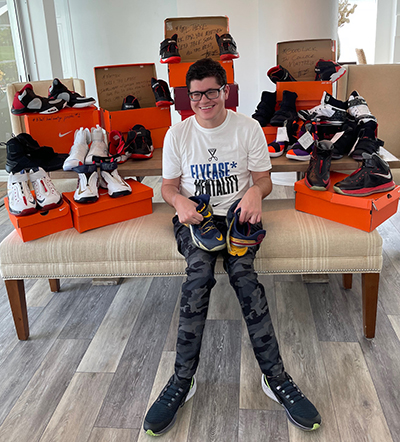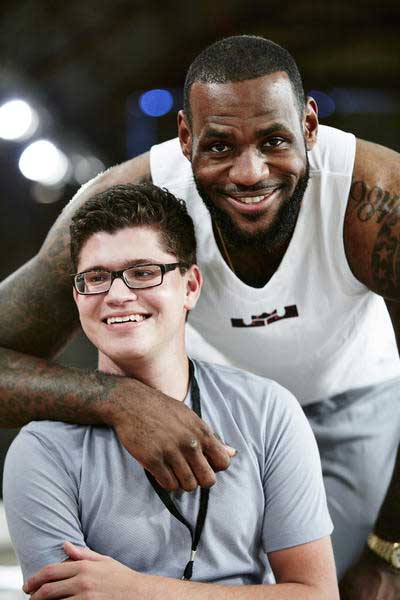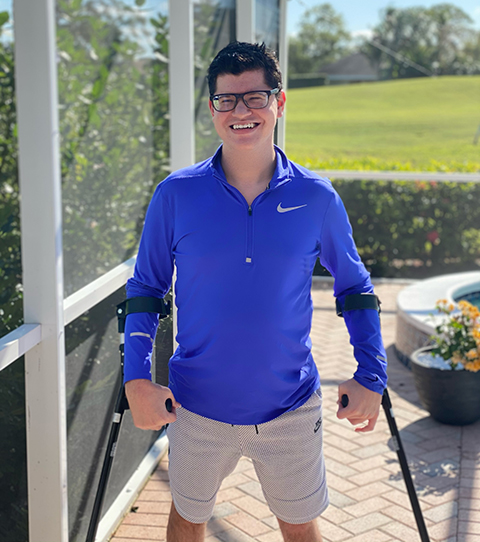Florida Gulf Coast University graduate Matthew Walzer is making a huge impact on the world – one step at a time.
As a teenager, Walzer sparked the world’s attention by writing a letter to Nike asking for sneakers that were adaptive for people like him who struggle with motor function, which makes it more difficult or impossible to do tasks such as putting on their shoes independently. He has flexibility in only one of his hands because of cerebral palsy.
Walzer always dreamed of going off to college, but being unable to tie his shoes always lingered in the back of his mind when considering his future.

“I wanted to go away to school and live on my own and be independent,” said Walzer. “And I didn’t want to have to worry about who was coming to tie shoes for me.”
Walzer’s online letter went viral, capturing Nike’s attention and spawning a collaboration on adaptive footwear that lasted from 2012 to 2015. Now, thanks to the sportwear giant’s recent release of a hands-free sneaker, he’s back in the media spotlight doing interviews and advocating for adaptability awareness.
Walzer remembers the exact date that the company sent him his first custom sneakers, a par of zipper and velcro Nike Hyperdunk basketball shoes. It was Oct. 28, 2012, and for the first time in the high school junior’s life he was able to put on shoes without any help.
“You put your shoes on or learn to tie your shoes by like, early elementary school,” Walzer said. “And it’s something that you, rightfully so, kind of take for granted for the rest of your life. But for me it’s still fresh in my mind, and that memory and that feeling of independence and liberation is still so visceral.”
The brand sent him rear-entry prototypes to test and give feedback on. Walzer then would provide insights on materials, cushioning, support and ease of entry and exit. This ultimately led to the release of the very first shoe in Nike’s Flyease line in 2015, the LeBron Zoom Soldier 8 Flyease.

Thanks in part to Walzer’s efforts, more people have been able to enjoy the sense of liberation he has. Nike recently released a hands-free shoe option in its FlyEase line. The new sneaker makes it easier for many people with disabilities to independently put on their shoes by simply sliding their foot in, leaving the shoe to do the rest of the work. The product’s announcement has turned a national spotlight on Walzer’s personal journey, which he’s shared in interviews ranging from National Public Radio to “The Drew Barrymore Show,” and given him a broader platform to further his cause.
“The world needs to follow in the footsteps of someone like Nike. Not just in products, but within government and infrastructure and in so many things on a federal level, on a local level, and say ‘How can we make things better for everybody in it?’ How you start doing that is by just listening and having real conversations to drive change and not just like lip service. At the end of the day there needs to be real results.”
Now, nine years later, Walzer is still working every day through personal and professional channels to be an advocate for adaptability and accessibility to ensure that people with disabilities are able to be as successful as anyone else.
“There’s still such a need for advocacy and for change for people with disabilities,” Walzer said. “For so long, people with disabilities always had to adapt to the world around us, and now truly with the importance of conversations around race and gender and ethnicity and just equality as a whole, the conversation needs to include people with disabilities and what the world can do to help us have not only equality but equity.”
Walzer’s journey began when he was born two months premature, weighing less than 3 pounds. At birth, he was diagnosed with cerebral palsy after his under-developed lungs were unable to deliver enough oxygen to his brain. Cerebral palsy is a neurological disorder that affects body movement and muscle coordination. For Walzer, it affects his walking, balance and fine motor skills. He is also legally blind in his left eye, as a result of the lack of oxygen at birth.
He spent the first 3 1/2 months of his life in the neonatal intensive care unit where doctors were unsure if he would survive. But even as a newborn, Walzer was a fighter.

Eventually, Walzer fulfilled his lifelong dream of going off to college, graduating with a management degree in 2018. His days at FGCU were filled with activities, including Pi Kappa Alpha. As a junior, he was invited to speak on a panel at The White House about designing apparel and assistive technology for people with special needs.
“There was a lot of adjusting in the beginning, as far as making sure I had certain things in housing to just be able to live comfortably and whatnot,” Walzer said. “By spring semester of my sophomore year, I rushed a fraternity. I was in Pike for 2 1/2 years, and I loved it. I still keep in touch with so many of them, even a couple of the guys that are still going there. I really had a blast. I obviously got a great education and the size of the campus and the proximity of everything in the area really allowed me to like, be so independent.”
Now 25 years old, Walzer spends every day advocating and fighting for what he believes in while sharing his own inspiring story. On Instagram, he documents the challenges that he and others with similar lifestyles face every day, like buying a vehicle — something that most people wouldn’t have to think twice about.
Walzer’s accessible van requires a ramp that enables him to easily enter, drive and exit independently. Unlike other car buyers, Walzer can’t drive it right off the lot. First, it has to be sent away so that all of the proper adaptations can be made for him to drive.
“There’s only a couple companies in the country that actually do handle the conversion aspect of it,” Walzer said. “Like cutting the floor and styling the ramp, making any other modifications that the driver would need. Some people use hand controls. I personally don’t, but whatever the person needs there’s only a couple third-party companies that are responsible for doing that, and they can take several months to get your car to where you can use it.”
Walzer also works as an advocate through his role as a communication specialist at the STARability Foundation in Southwest Florida. STARability strives to transform the lives of individuals with disabilities through social, vocational and educational connections to the community, while strengthening awareness and respect for individual abilities.
“It sounds cliche, but my goals are just to keep advocating and bringing awareness to so many things that people don’t even think about that we deal with or have to deal with at some point, and the hurdles that we have to go through to get basic things like a car,” Walzer said. “Ultimately, I would love to work with other companies even, in the automobile industry, to show people how advantageous something like a self-driving car, a truly universally accessible vehicle, would be for people with disabilities.”
- Student contributor Hannah Lee is a senior from Melbourne majoring in communication, with a concentration in public relations, and minoring in journalism.